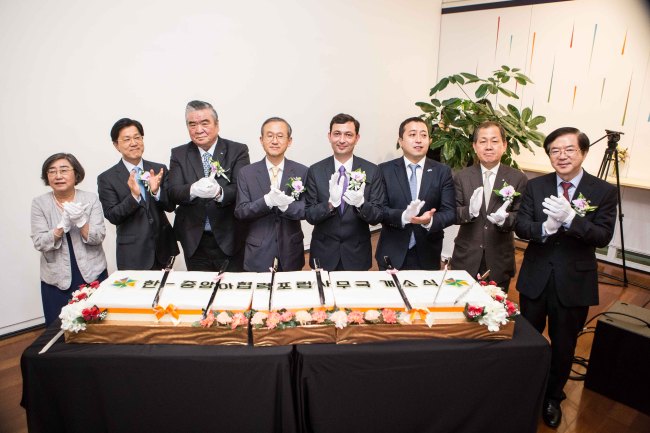South Korea and five Central Asian countries on Monday launched an office in Seoul to facilitate diplomatic, business and people-to-people cooperation through high-level dialogue, exchanges of working-level public officials and cultural festivals.
The Korea-Central Asia Cooperation Forum Secretariat is the first joint permanent body between the countries and represents progress they have made since the forum was incepted 10 years ago as a high-level consultative mechanism.
South Korea and the five countries -- Uzbekistan, Kazakhstan, Kyrgyzstan, Tajikistan and Turkmenistan -- agreed on the plan during last year’s forum. The secretariat will be headed by Kim Gwang-keun and will operate under the Korea Foundation, a state-run public diplomacy agency.
Officials from the Central Asian countries are also stationed at the organization, tasked with raising public awareness on their countries here and offering advice for South Korean businesses and civic groups seeking to make a foray into the booming markets.
“Since the forum’s initiation, the government has been pursuing greater cooperation with the region regardless of leadership changes,” a Korea Foundation official said, referring to former President Lee Myung-bak’s resources diplomacy and his successor Park Geun-hye’s “Eurasia Initiative.”
“With Central Asia being at the geographical center of Eurasia cooperation, the secretariat’s founding means that the Moon Jae-in administration will continue to expand the partnership with the countries in the region.”
 |
Participants pose at the launching ceremony for the Korea-Central Asia Cooperation Forum Secretariat in Seoul on Monday. Among them are South Korea's Vice Foreign Minister Lim Sung-nam (fourth from left), Korea Foundation president Lee Si-hyung (second from left), the secretariat's inaugural director Kim Gwang-keun (far right), former Uzbekistani Ambassador to South Korea Vitaly Fen (third from left) and Turkmenistani Ambassador to South Korea Myrat Mammetaliyev (third from right). (KF) |
Since their independence from the former Soviet Union, the Central Asian countries have been looking to transform their economies on the back of vast underdeveloped territory and ample natural resources.
The region is estimated to account for about 6 percent and 3 percent of the world’s gas and crude reserves, respectively.
China’s “One Belt and One Road” initiative is also lending impetus for the development of transport and logistics infrastructure there, while Japan has recently proposed 2 trillion won ($1.7 billion) worth of infrastructure investment, industrial training and eased visa rules.
This year marks the 25th anniversary of the establishment of diplomatic relations between Seoul and the five.
A multitude of state-run and private Korean businesses including Samsung, LG and Hyundai Engineering have been building power and chemical plants, renovating refining facilities and drilling gas in Kazakhstan, Uzbekistan and Turkmenistan.
Some 500,000 ethnic Koreans live across Central Asia, about 200,000 of which are in Uzbekistan.
By Shin Hyon-hee (
heeshin@heraldcorp.com)







![[Today’s K-pop] Blackpink’s Jennie, Lisa invited to Coachella as solo acts](http://res.heraldm.com/phpwas/restmb_idxmake.php?idx=644&simg=/content/image/2024/11/21/20241121050099_0.jpg)
